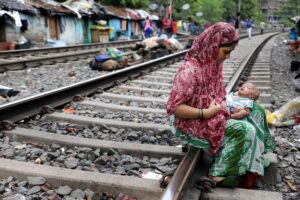According to the National Family Health Survey (NFHS) – 5, the number of stunted children under the age of five in India has decreased from 38.4 percent to 35.5 percent, and the number of children who are underweight has decreased from 35.8 percent to 32.1 percent.
As per proven research, newborns should be fed mother’s milk exclusively for six months. Breastfed children are more likely to have stronger immunity against ear infections, diarrhea, and respiratory infections, besides allergies, asthma, diabetes, and obesity. Breastfeeding helps the uterus contract and reduces the mother’s risk of breast, uterine, and ovarian cancer too.
To combat the rising problems of undernourishment and manage it in a mission-like way, the Prime Minister’s National Nutrition Mission, or POSHAN Abhiyaan, was launched in 2018.

While lactating, a woman’s energy needs will rise in order for her to maintain her vigour. Specific food categories provide energy, which is measured in kilocalories or calories. During the first six months of breastfeeding, they will need to ingest at least 2400 to 2700 kcal each day. Because women will be solely breast-feeding their infant, their body’s energy requirements are higher during this time. However, as they begin weaning by providing diversity to their baby’s food in the last six months, they will breastfeed less frequently, lowering their daily energy demand to 2250 to 2550 kcal.
Lactating women should always include these in their diet
- Milk products that are rich in calcium
- Fruits for better fiber
- Dals and pulses rich in protein
- Cereals like Jowar, bajra, wheat
Initiatives taken by various State Governments to Fight Malnutrition
The Odisha government launched CMAM in the tribal-dominated Kandhamal district in 2015, which had the state’s highest proportion of under 5-year child mortality in 2012–13. Setting up medical facilities closer to people, weekly surveillance of unfussy SAM children, an in-patient facility to admit children with SAM and associated medical complications, and provision of Modified Energy Dense Nutritional Food (EDNRF), Modified Hot Cook Meal (HCM), and Modified Take Home Ration were all part of a standard CMAM approach (THR).
After treatment, the focused programme resulted in children gaining the necessary weight, considerably increasing the district’s nutritional status. Odisha’s success in community-led and community-managed trials in a variety of disciplines has set an example.
States like Kerala has consistently been a forerunner of such practices. Encouragingly, Odisha has been able to achieve this level with consistent endeavour for the last 20 years, thanks to the Mission Shakti Programme, a plan that initially organized women into self-help organizations as a livelihood project. Rajasthan, Gujarat, and Uttar Pradesh are the other states that have demonstrated the efficiency of this strategy too.
Conclusion
Because CMAM has the ability to combat severe acute malnutrition by building strong health systems, a community-wide collaborative effort will ensure the efficient delivery of long-term healthcare. Furthermore, while prioritizing SAM, drawing from lessons learned in other states will be crucial in combating the rising malnutrition problem.
Multiple forms of malnutrition (MOM) lower roughly 8 per cent of a country’s economic growth, according to a Lancet 2019 research. Because a country’s wealth is determined not only by its citizens’ talents and education, but also by their health and nutrition, it is past time for India to address the needs of its eight million SAM children if it is to achieve a USD 5 trillion economy by 2024-25.
Smile Foundation’s role
We have been actively striving to reduce malnutrition as part of our work with mothers and children. We guarantee that students receive healthy and nutritious meals at our Mission Education centers. We are also sensitizing their parents about it. We are continually enabling and supporting community women as well as new-born through our Swabhiman programme. Above all, tailor-made nutrition projects are also operational at various pockets across India.
You can also take up an active role in ensuring nourishment, find out more here.









